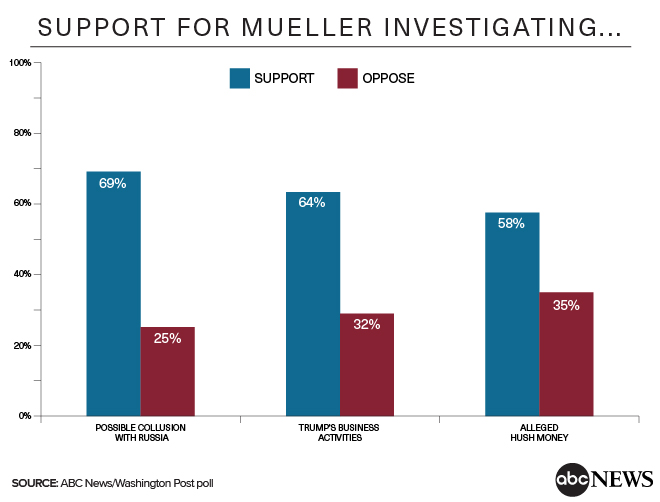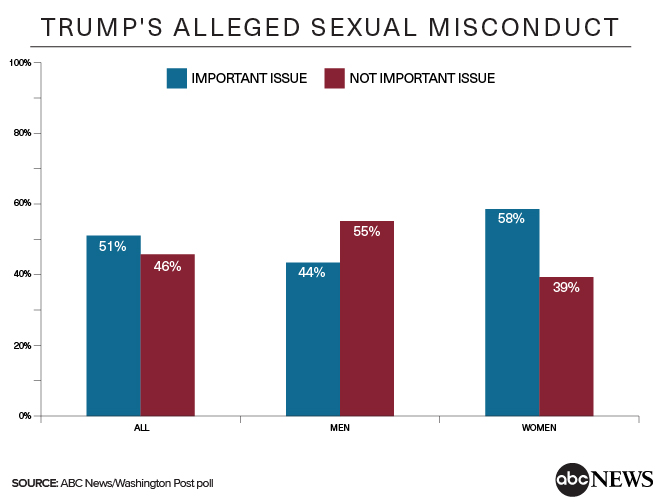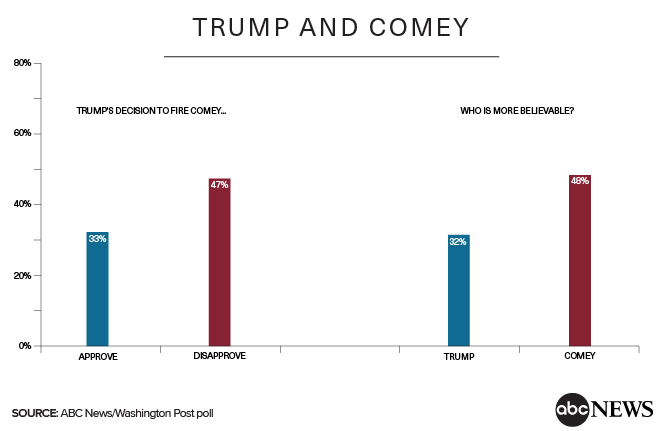Majorities back investigations of Trump from Russia to alleged hush money (POLL)
Robert Mueller has majority support in a new ABC News/Washington Post poll.
Special counsel Robert Mueller has majority support in a new ABC News/Washington Post poll for extending his investigation into both Donald Trump’s business dealings and the alleged payment of hush money to women who say they’ve had affairs with the president in the past.
The public by a broad 69-25 percent supports Mueller’s initial thrust, to investigate possible collusion between Trump campaign officials and Russian government attempts to influence the 2016 election. Support extends to half of conservatives and more than four in 10 Republicans.
See PDF for full results, charts and tables.
Backing for Mueller’s work goes further: Americans by 2-1, 64-32 percent, also support his investigating Trump’s business activities. And by 58-35 percent, a 23-point margin, they support investigators’ latest apparent direction, looking at allegations that Trump’s associates paid hush money to women who say they had affairs with him.

Notably, women are a non-significant 5 points more apt than men to support the Russia investigation and 8 points more apt than men to support Mueller looking into Trump’s business dealings -- but 15 points more likely than men to support the hush-money investigation. Sixty-five percent of women support it, vs. 50 percent of men.
There’s a similar gap on the perceived importance of whether or not Trump has engaged in a pattern of sexual misconduct. The public overall divides, 51-46 percent, on whether this is or is not an important issue. Fifty-eight percent of women say it’s important, vs. 44 percent of men in this poll, produced for ABC News by Langer Research Associates.

Comey
The survey also finds lower believability for Trump than for fired FBI Director James Comey, whose interview with ABC News chief anchor George Stephanopoulos airs Sunday night in advance of publication of Comey’s new book. Americans by a 16-point margin, 48-32 percent, find Comey more believable than Trump.
The public, by a similar 14-point margin, 47-33 percent, disapproves of Trump’s decision to fire Comey. That’s even though Comey’s own favorability rating is weak: Thirty percent see him favorably, 32 percent unfavorably, with a plurality, 38 percent, having no opinion of him.
Groups
Partisanship informs many of these views. Ninety percent of Democrats and 70 percent of independents support Mueller investigating possible campaign collusion with Russia, vs. 43 percent of Republicans. (That’s still a substantial number within the president’s own party, notable especially given the Republican National Committee’s criticisms of Comey, including a website titled “Lyin’ Comey.”) Forty-two percent of Trump’s own approvers also support the Russia investigation by Mueller.

Similarly, support for the Russia investigation ranges from 89 percent of liberals, 73 percent of moderates and 58 percent of “somewhat” conservatives to just 39 percent among Americans who call themselves “very” conservative (14 percent of all adults).
Compared to support for the Russia investigation, support for Mueller investigating Trump’s business dealings drops by 9 points among Republicans and 11 points among strong conservatives, while holding steadier in other groups. In the same comparison, support for investigating alleged hush money payments drops by 9 to 14 points across political and ideological spectrums, while maintaining majority backing overall. Support for investigating alleged hush money falls in particular among Trump approvers, by 18 points.
Other results on Mueller follow these political and ideological divisions, with support for his investigations highest among young adults and lowest among older ones, higher among nonwhites vs. whites, and notably lower in rural and small-town areas vs. cities and suburbs, as well as among evangelical white Protestants and noncollege-educated white men, two core Trump groups.
There likewise are sharp divisions on Comey. Republicans find Trump more believable than Comey by 70-15 percent, as do strong conservatives by 76-9 percent and somewhat conservatives by 49-24 percent. Democrats and liberals overwhelmingly find Comey more believable; independents and moderates side with Comey as well, by 48-29 and 57-22 percent, respectively.
Again these carry forward to other groups. Whites divide evenly on whom they believe, while nonwhites pick Comey by 63-15 percent. Men also divide evenly, while women believe Comey over Trump by more than 2-1, 54-25 percent. While seniors side with Comey by a slight 9 points, young adults do so by a 28-point margin.
Evangelical white Protestants (who account for about one in 10 adults) believe Trump over Comey by 61-23 percent, while non-evangelical white Protestants (an additional one in 10) divide by a far closer 45-38 percent. Non-college white men take Trump’s word by 53-28 percent; college-educated white women, Comey’s by 60-27 percent.
Lastly, on the question of sexual misconduct, the overall result -- again a 51-46 percent division on whether it’s an important issue -- is similar to what it was for Bill Clinton in an ABC News poll in 1998, 48-50 percent. But then 52 percent of men and 45 of women saw the issue as important, compared with the 44 percent of men and 58 percent of women today.
This gender gap appears among Democrats (78 percent of women say it’s an important issue, vs. 68 percent of men) and independents (55 percent of women vs. 43 percent of men). But there’s no significant difference between Republican women and men: Twenty-seven and 23 percent, respectively, think it’s important.
Methodology
This ABC News/Washington Post poll was conducted by landline and cellular telephone April 8 to April 11, 2018, in English and Spanish, among a random national sample of 1,002 adults. Results have a margin of sampling error of 3.5 points, including the design effect. Partisan divisions are 32-25-35 percent, Democrats-Republicans-independents.
The survey was produced for ABC News by Langer Research Associates of New York, N.Y., with sampling, data collection and tabulation by Abt Associates of Rockville, Md. See details on the survey’s methodology here.